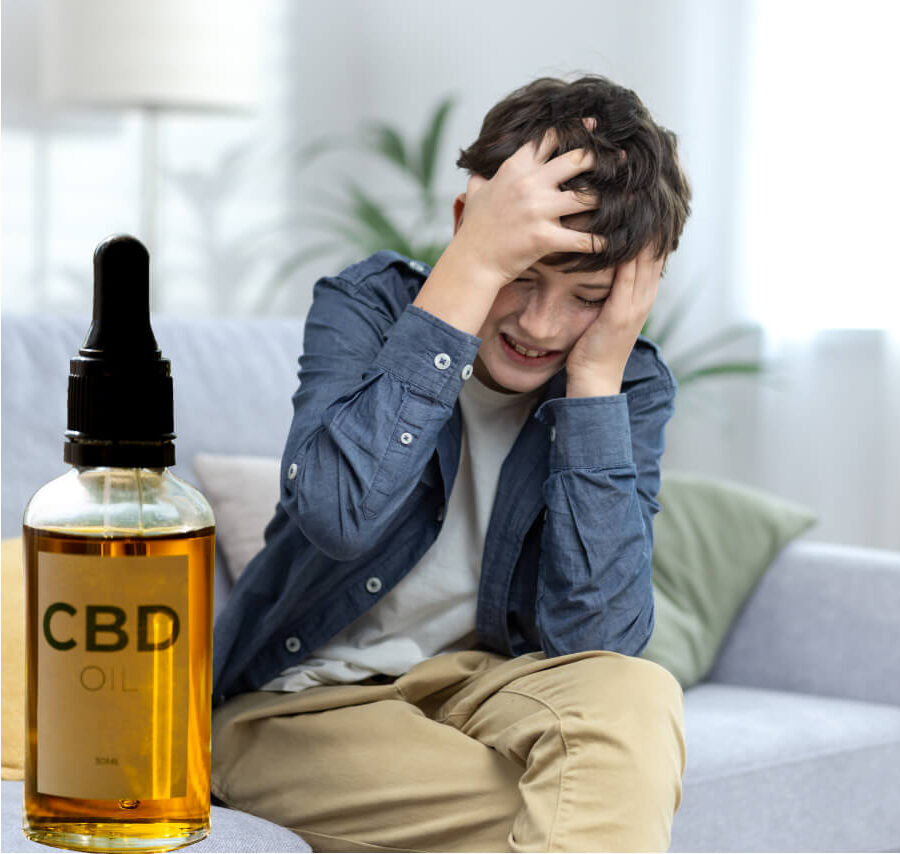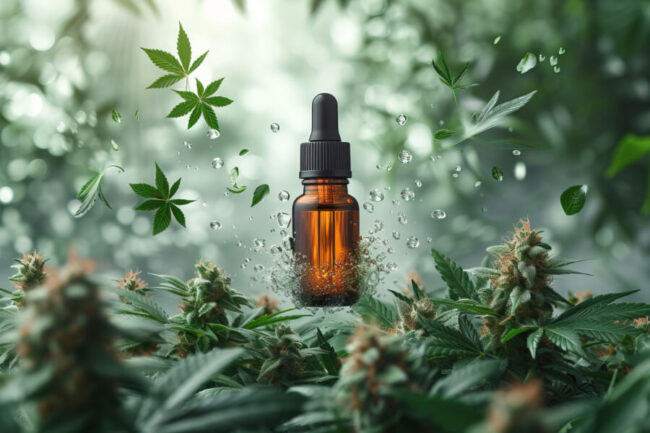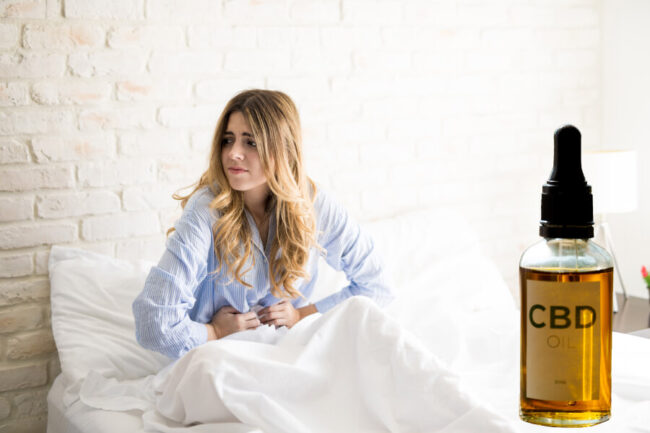Autism spectrum disorder (ASD) is a complex neurodevelopmental condition that affects how a person communicates, interacts, and behaves.
ASD can cause various challenges, such as anxiety, stress, aggression, self-injury, and social difficulties.
While there is no cure for ASD, some treatments and therapies can help improve the quality of life of people with ASD and their families.
One of the emerging options that has gained attention in recent years is cannabidiol (CBD) oil.
CBD is a natural compound derived from the cannabis plant that has many potential health benefits, such as reducing pain, inflammation, seizures, and anxiety.
Unlike tetrahydrocannabinol (THC), another compound found in cannabis, CBD does not cause psychoactive effects or a “high”.
But can CBD oil really help people with ASD? What does the current research say? And what are the risks and benefits of using CBD oil for autism? In this blog post, we will explore these questions and more.
Can CBD oil help people with ASD?
There is not enough scientific evidence to conclusively answer this question. However, some preliminary studies and anecdotal reports suggest that CBD oil may have some positive effects on some symptoms and behaviors associated with ASD.
For example, a 2019 study1 from Israel found that CBD oil improved communication, anxiety, and behavioral problems in 155 children with ASD.
The study used a CBD-enriched cannabis extract that also contained some THC, but at a low dose. The researchers reported that 80% of the parents observed a decrease in problematic behaviors, 62% reported significant improvement in social communication, and 40% reported significant decrease in anxiety.
Another 2019 study2 from Brazil found that CBD oil reduced anxiety and stress in 15 children with ASD.
The study used pure CBD oil with no THC. The researchers measured the levels of cortisol, a hormone that indicates stress, in the children’s saliva before and after CBD treatment. They found that CBD oil significantly reduced cortisol levels and improved the children’s social and emotional functioning.
These studies are promising, but they have some limitations, such as small sample sizes, lack of control groups, and short duration.
More rigorous and long-term research is needed to confirm the safety and efficacy of CBD oil for ASD.
How does CBD oil work for ASD?
The exact mechanism of how CBD oil works for ASD is not fully understood.
However, some researchers believe that CBD oil may interact with the endocannabinoid system (ECS), a network of receptors and molecules that regulates various bodily functions, such as mood, pain, inflammation, and immune response.
The ECS is also involved in brain development and neuroplasticity, which are crucial for learning and adaptation.
Some studies have suggested that people with ASD may have an imbalance or dysfunction in the ECS, which may contribute to some of their symptoms and behaviors .
CBD oil may help restore the balance and function of the ECS by modulating the activity of the receptors and enhancing the production of endocannabinoids, the natural compounds that bind to the receptors.
By doing so, CBD oil may have a neuroprotective and neuroinflammatory effect, as well as a calming and anti-anxiety effect.
What are the risks of using CBD oil for ASD?
CBD oil is generally considered to be safe and well-tolerated, but it may have some side effects and interactions.
Some of the possible side effects of CBD oil include:
- Drowsiness
- Dry mouth
- Diarrhea
- Reduced appetite
- Changes in weight
- Changes in blood pressure
- Changes in liver enzymes
Some of the possible interactions of CBD oil include:
- Antidepressants
- Antipsychotics
- Anticonvulsants
- Blood thinners
- Sedatives
- Opioids
CBD oil may also affect the metabolism and effectiveness of these medications, so it is important to consult with a doctor before using CBD oil if you or your child are taking any of these medications.
Additionally, CBD oil may have some legal issues depending on where you live and where you buy it.
CBD oil derived from hemp is legal in most states and countries, as long as it contains less than 0.3% THC.
However, CBD oil derived from marijuana or containing higher amounts of THC may be illegal or require a medical prescription in some places.
Therefore, you should always check the laws and regulations of your location and the source of your CBD oil before using it.
How to use CBD oil for ASD?
There is no standard dosage or method of using CBD oil for ASD, as it may vary depending on the individual’s weight, age, metabolism, symptoms, and preferences.
However, some general tips and guidelines are:
Start low and go slow. Begin with a low dose of CBD oil, such as 5 to 10 mg per day, and gradually increase it until you find the optimal dose that works for you or your child.
Monitor the effects and side effects of CBD oil and adjust the dose accordingly.
Choose a high-quality product. Look for a CBD oil that is organic, lab-tested, and contains no additives, preservatives, or artificial flavors.
Check the label and the certificate of analysis (COA) of the product to verify the ingredients, potency, and purity of the CBD oil.
Avoid products that make unrealistic or unproven claims about CBD oil.
Choose a suitable delivery method. CBD oil can be consumed in different ways, such as oils, tinctures, capsules, edibles, topicals, and vapes.
Each method has its own advantages and disadvantages, such as onset time, duration, bioavailability, and convenience.
Choose the method that suits your or your child’s needs and preferences.
For example, oils and tinctures can be taken sublingually (under the tongue) for faster and more efficient absorption, while edibles and capsules can be swallowed for longer and more consistent effects.
Topicals can be applied to the skin for localized relief, while vapes can be inhaled for immediate and potent effects.
Consult with a doctor. Before using CBD oil for ASD, it is advisable to consult with a doctor who is knowledgeable and experienced in CBD and cannabis.
A doctor can help you determine the best dose, delivery method, and product for you or your child, as well as monitor the effects and interactions of CBD oil.
A doctor can also provide you with a medical prescription if needed.
Conclusion
CBD oil is a natural and promising option for people with ASD who are looking for alternative or complementary treatments.
CBD oil may help improve some of the symptoms and behaviors associated with ASD, such as anxiety, stress, aggression, and communication.
However, CBD oil is not a cure for ASD, and more research is needed to confirm its safety and efficacy.
CBD oil may also have some side effects and interactions, so it is important to use it with caution and under medical supervision.
If you are interested in trying CBD oil for ASD, make sure to choose a high-quality product, start with a low dose, and consult with a doctor.
FAQs
Can CBD Oil Help Manage Autism Symptoms?
Research suggests that CBD oil may have a positive impact on managing certain symptoms associated with autism, such as anxiety, sleep disturbances, and behavioral challenges.
However, it’s crucial to note that individual responses may vary, and consulting with a healthcare professional is recommended.
What Does the Research Say About CBD and Autism?
While some studies indicate that CBD oil might be beneficial for individuals with autism, more comprehensive research is needed to fully understand its effectiveness and safety.
Some findings suggest a potential for alleviating specific symptoms, but conclusive evidence is still evolving.
Are There Risks or Side Effects of Using CBD for Autism?
Like any supplement, CBD oil may have side effects, and its safety for long-term use in individuals with autism is not fully established.
Common side effects include fatigue, changes in appetite, and digestive issues.
It’s crucial to discuss potential risks and benefits with a healthcare professional, especially when considering its use for children.
How Should CBD Oil be Administered for Autism?
The optimal method and dosage of CBD oil for autism may vary among individuals. Some prefer oral tinctures, while others may use capsules or edibles.
It’s essential to start with a low dose and gradually increase while closely monitoring the individual’s response.
Consulting with a healthcare provider can help determine the most suitable administration method.
Is CBD Oil Legal and Accessible for Autism Treatment?
The legal status of CBD for autism varies across regions, and regulations can impact its accessibility.
In some places, CBD is legal, while in others, restrictions may apply.
It’s important to be aware of local laws and consult with a healthcare professional to ensure compliance and safe usage.
Can CBD Replace Conventional Autism Treatments?
CBD oil should not be viewed as a replacement for conventional autism treatments.
Evidence supporting its efficacy is still emerging, and it is not a cure for autism.
It can potentially complement existing treatments, and any decision to incorporate CBD into a treatment plan should be made in consultation with healthcare professionals familiar with the individual’s medical history.





